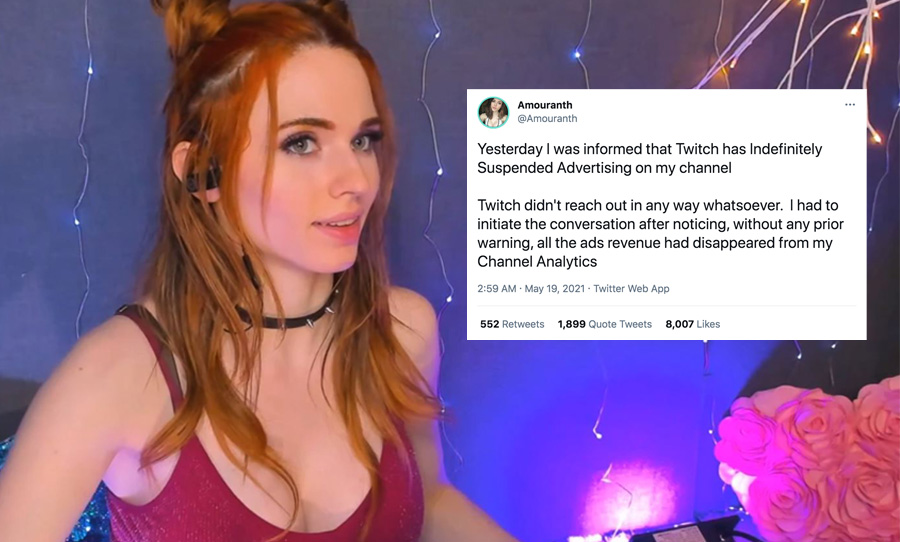The ‘hot tub meta’ trend has allowed streamers to wear swimwear through a regulatory loophole, but Twitch has struck back by blocking Amouranth’s ad revenue without warning, setting an alarming precedent for platform moderation.
The building tensions surrounding Twitch’s latest controversial trend have come to a head, with one of the most popular ‘hot tub meta’ streamers left suffering the consequences. Kaitlyn ‘Amouranth’ Siragusa, who has 2.8 million followers on the platform, has suddenly lost all ad revenue for her channel.
The model and streamer is one of the biggest names on Twitch, who has gained extreme popularity from participating in the recent ‘hot tub meta’ trend. It’s exactly what it sounds like – streamers wearing swimwear in a hot tub or pool while they chat or play – but it’s been sparking a whole lot of debate ranging from the overt sexualisation of women’s bodies to lack of transparency in content moderation.

The trend was born out of a loophole in Twitch’s guidelines, which prohibits content that is sexually suggestive within the context of the stream. There are contextual exceptions to general rules surrounding partial nudity, such as swimwear being permitted as long as it is opaque and covers the genitals and nipples (only for those present as women, as per usual double standards).
This exception is what allowed the phenomenon to begin, with Twitch allowing swimwear in the context of a hot tub or pool, as it is not innately sexual in such a scenario. So the streamers took to their nearest bodies of water (or used green screens to simulate a hot tub if they didn’t own one) and were technically allowed to continue streaming.
Yesterday I was informed that Twitch has Indefinitely Suspended Advertising on my channel
Twitch didn't reach out in any way whatsoever. I had to initiate the conversation after noticing, without any prior warning, all the ads revenue had disappeared from my Channel Analytics
— Amouranth (@Amouranth) May 18, 2021
It seems that this exception may, however, be no more. Amouranth recently took to Twitter to inform her 1.2 million followers that Twitch has indefinitely suspended advertising on her channel.
The streamer was not even informed of the change by Twitch, having to instead initiate the conversation herself after noticing the complete, unwarned disappearance of ads revenue from her channel analytics.
The sudden blocking of Amouranth’s revenue is an issue on two distinct levels; it both perpetuates the misogynistic double standards that permeate the platform and highlights more widespread concerns about Twitch’s regulation practices.
https://twitter.com/Froskurinn/status/1388157522377383941?ref_src=twsrc%5Etfw%7Ctwcamp%5Etweetembed%7Ctwterm%5E1388157522377383941%7Ctwgr%5E%7Ctwcon%5Es1_&ref_url=https%3A%2F%2Fhappymag.tv%2Fhot-tub-meta-twitch%2F
On one level, we must question the very nature of Twitch’s problem with Amouranth’s content. A woman’s body is not inherently sexual, no matter how much of it is shown.
The distinction between ‘sexy’ and ‘sexual’ seems to have little impact on the implementation of Twitch’s guidelines, which will ban a woman in revealing clothes even if she is participating in a wholly non-sexual activity (like working out in a midriff).
Beyond confusing boundaries defining sexual content in the existing guidelines, Twitch’s communication with Amouranth (or lack thereof) points to wider issues of regulation. The streamer explained her concerns around the sudden removal of her revenue stream on Twitter:
“This is an alarming precedent and serves as a stark warning that although content may not ostensibly break community guidelines or terms of service, Twitch has complete discretion to target individual channels and partially or wholly demonetise them for content that is deemed ‘not advertiser friendly’, something that there is no communicated guideline for.”
there's something to go by. There is no known policy for what results in a streamer being put on this blacklist. With characteristic opacity, The only thing twitch made clear is that it is unclear whether or when my account can be reinstated.
— Amouranth (@Amouranth) May 18, 2021
It appears that while Amouranth was taking advantage of one loophole, Twitch was exercising one of their own. There’s enough debate surrounding ambiguity in Twitch’s written terms of service that determine the banning of accounts or removal of content, but when it comes to censoring ad revenue, there is no known policy for what puts a streamer on the blacklist.
Amouranth concluded that “with characteristic opacity, the only thing Twitch made clear is that it is unclear whether or when my account can be reinstated”, exposing what appears to be a lack of certainty about regulatory practices even internally at Twitch.
This issue expands far beyond sexual content, though female gamers who are deemed provocative are certainly among the most likely to be impacted. With no transparency around Twitch’s power to demonetise streamers without warning or explicit reasoning, any creator could lose their income if deemed a risk to brands.
People who are cheering about Twitch removing @Amouranth's revenue will be real mad soon when their favorite streamer gets nuked for being a brand risk. If you think this stops at sexual content, think again.
— Devin (@DevinNash) May 19, 2021
Of course, matching advertisements to streamers with appropriate content and aligned audiences is an important aspect of online marketing, but completely cutting off a revenue stream out of the blue could be a devastating blow for some creators. In a stream from her hot tub shortly after her announcement, Amouranth explained why the sudden removal was so unsettling:
“The issue isn’t Twitch removing ads. It’s them doing so without any clarification of what their guidelines are. We saw this coming. Everyone expected it. No one expected it without communication, though. Just, like, a stealth removal.”
She went on to express gratitude for her diversified income portfolio, which also includes Instagram, OnlyFans, YouTube, and brand sponsorships, before emphasising that not all streamers are so fortunate.
https://twitter.com/PkmnMasterHolly/status/1394700640459255808
The question must also be asked of who this could affect next – it’s not unusual for streamers to dabble in gambling while live, which could easily be condemned by advertisers. On the other hand, Amouranth pointed out that condom ads are completely normal on Twitch, so ‘adult’ subject matter is freely allowed on the platform when it’s coming from the advertisers themselves.
Beyond being a blatant double standard, it’s also a question why this advertising content can’t be matched with a content creator that is deemed sexual. Does the umbrella justification of Amouranth’s content not being ‘advertiser friendly’ really apply when such ads exist on the platform?
A troubling precedent is being set. One where Twitch can and will do as it pleases to its own partners’ monetisation without communicating a set of guidelines or a process of regulation. It’s something that Amouranth wants simply wants to get the word out about for now, before more creators get unexpectedly hurt.
People celebrating that @Amouranth lost her ad revenue indefinitely are missing the point entirely 🙄
— Yabbe (@ImYabbe) May 18, 2021
She does believe there’s one silver lining: “if they hold fast to this posture, it might open the door to a more lenient terms of service, as long of the creator isn’t concerned about monetising the content.”
Regardless of what kind of content you believe belongs on Twitch, blocking creators from either sharing or profiting from their content without complete transparency around the relevant guidelines is not the way to fairly regulate a platform. Twitch’s communication practices, at the very least, need to change.



